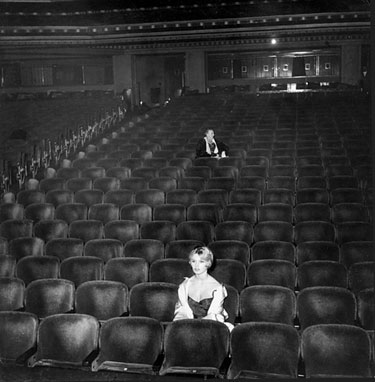Lucidno
Solitude in the Cinema
|
The cinema, the C I N E M A ! A vanishing institution, a disappearing place. And an institution, a place, perfect for the vanishing act. Where will we go to get lost once the cinema halls will have vanished into thin air? "All that is solid melts into air, all that is holy is profaned, and man is at last compelled to face with sober senses, his real conditions of life, and his relations with his kind", Karl Marx and Friedrich Engels wrote in their Communist Manifesto1, and in 1848 they certainly were not talking about the cinema. But perhaps the cinema was the answer to the situation they described. Do we want to face our crumbling lives – and, worse so, with "sober senses"? Our ambiguous relations with our ambivalent kind? And sobriety? What about the little escape route, the fun and lust in getting lost?
In 2003 I gave a paper2 on "Notions of Solitude" at a New Delhi conference. I spoke about the beautiful moment of darkness and silence in the cinema before the film screening begins. I had almost forgotten about that presentation, when last year I suddenly came across these lines: what this moment has to offer: a chance to get lost, a chance to not know, a chance to close our tired eyes just for a moment, [...] |
a chance to forget what is there to be forgotten, [...] a chance to feel the excitement in the stomach, [...] Let's enjoy the darkness3 The Croatian choreographer Ivana Müller wrote these lines about dance theatre performances, but in my eyes they describe the cinema situation just as well. What is that strong tie between the cinema experience and darkness and loneliness? I believe solitude is the basis, the pre-requisite, for the perception of films, because you cannot "feel the excitement in the stomach" - and in fact you cannot feel or think much at all – if your perception and consciousness are not based on a state of solitude, of openness, awareness and concentration. No matter whether you go to see a movie by yourself or with friends, during the screening of the film you are alone. However, only one very precious moment really makes you aware of this. And that is, when the lights are slowly dimmed and darkness falls - complete darkness and complete silence. It's not dark yet, but it's getting there4 To me, this is the most beautiful and the most precious moment in cinema: you are completely aware of yourself and of your solitude. As there is nothing out there to see, your glance wanders inward. This is a moment of meditation. The world outside has come to a sudden but not unpredicted halt. You have belief. You trust. You hand yourself over to the things to come, to a mildly and pleasantly dubious experience. You just sit there and stare into the darkness, full of expectations, open to anything, but open especially for a certain kind of seduction you have come to look for in the darkness of the cinema hall. Everything is still possible. You are at the beginning, at the starting point of a new life, a life without pre-set parameters. To me, one of the most beautiful things in this world is arriving in a new city, in a place I have never been. I dump my suitcase in my hotel room, and then I go out, wandering around aimlessly, without a goal, without a map, without any idea of the city, often without any knowledge of the local language. I walk intuitively, see and hear things much more clearly than usually. I react to coincidences that come my way, and I hope I will get lost – lost just to a certain amount, just so that I can feel a tickle in my stomach, perhaps a slight fear. This is an adventure: I get lost in the world and then I find myself again. I expose myself to the world, I get some affirmation and comfort from it, and that experience usually makes me feel a little bit more at home in it. At their very best, this is what good films can give me, too. |
____________
1 Karl Marx & Friedrich Engels: The Communist Manifesto, http://www.myoops.org/twocw/mit/NR/rdonlyres/Political-Science/17-100JPolitical-Economy-I--Theories-of-the-State-and-the-EconomyFall2002/23C6C1A9-899F-4F66-9D7F-D4D6DCA7E40A/0/communist_manifesto.pdf (March 21, 2012).
2 and published it: Andreas Ströhl: Darkness and Silence. in: CINEMAYA. The Asian Film Quarterly No. 61 – 62, New Delhi Winter – Spring 2003-04, p. 80 f.
3 Ivana Müller: Into the Light. Utrecht 2007, p.9.
4 Bob Dylan: Not Dark Yet (Time Out of Mind, 1997).


